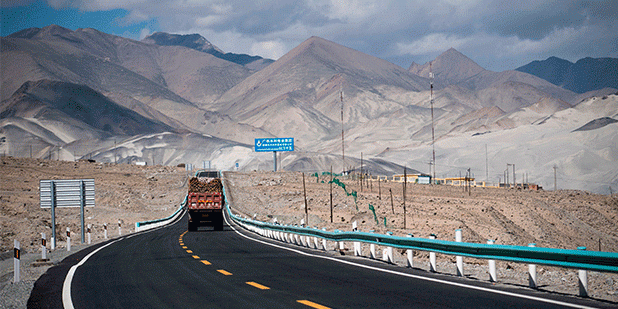Join us for a free one-day workshop for educators at the Japanese American National Museum, hosted by the USC U.S.-China Institute and the National Consortium for Teaching about Asia. This workshop will include a guided tour of the beloved exhibition Common Ground: The Heart of Community, slated to close permanently in January 2025. Following the tour, learn strategies for engaging students in the primary source artifacts, images, and documents found in JANM’s vast collection and discover classroom-ready resources to support teaching and learning about the Japanese American experience.
Webcast: Sovereignty and the Belt and Road Initiative
Please join the USC U.S.-China Institute and the USC Center for International Studies for webcast discussion with Professor Tom Narins from the University at Albany (SUNY Albany) on how the Belt and Road Initiative illustrates ways that sovereignty works that conventional international relations fail to account for.

Watch a recording of the webinar.
Historical and conventional international relations frameworks describe the Belt and Road Initiative (BRI) as representing a newly ambitious Chinese drive into global politics, a break from China’s longstanding reticence towards foreign entanglements. As a result, there seems to be a contradiction between China simultaneously defending its own territorial sovereignty while also being engaged in various projects (including the Asian Infrastructure Investment Bank) that point in other directions. In this talk, Prof. Narins explores how the BRI illustrates ways that sovereignty works that conventional international relations fail to account for.
About the Speaker
 Tom Narins is a professor of geography at the University at Albany (SUNY Albany). Prior to becoming an academic, Tom worked in China and Latin America for The MacLellan Group, which, as a multinational holding group, had several China-centric companies in its portfolio. Tom’s current research focuses on the geopolitics of the Belt Road Initiative as well as China’s overseas trade and investment in the developing world, with an emphasis on activity in Latin America and the Caribbean. He has authored or co-authored papers on China's economic and political engagement beyond its borders in a wide variety of journals. His current projects include developing a political-economic index for assessing the attraction of Chinese investment, trade, and loan-making across Latin America and the Caribbean.
Tom Narins is a professor of geography at the University at Albany (SUNY Albany). Prior to becoming an academic, Tom worked in China and Latin America for The MacLellan Group, which, as a multinational holding group, had several China-centric companies in its portfolio. Tom’s current research focuses on the geopolitics of the Belt Road Initiative as well as China’s overseas trade and investment in the developing world, with an emphasis on activity in Latin America and the Caribbean. He has authored or co-authored papers on China's economic and political engagement beyond its borders in a wide variety of journals. His current projects include developing a political-economic index for assessing the attraction of Chinese investment, trade, and loan-making across Latin America and the Caribbean.
Featured Articles
Please join us for the Grad Mixer! Hosted by USC Annenberg Office of International Affairs, Enjoy food, drink and conversation with fellow students across USC Annenberg. Graduate students from any field are welcome to join, so it is a great opportunity to meet fellow students with IR/foreign policy-related research topics and interests.
RSVP link: https://forms.gle/1zer188RE9dCS6Ho6
Events
Hosted by USC Annenberg Office of International Affairs, enjoy food, drink and conversation with fellow international students.
Join us for an in-person conversation on Thursday, November 7th at 4pm with author David M. Lampton as he discusses his new book, Living U.S.-China Relations: From Cold War to Cold War. The book examines the history of U.S.-China relations across eight U.S. presidential administrations.




